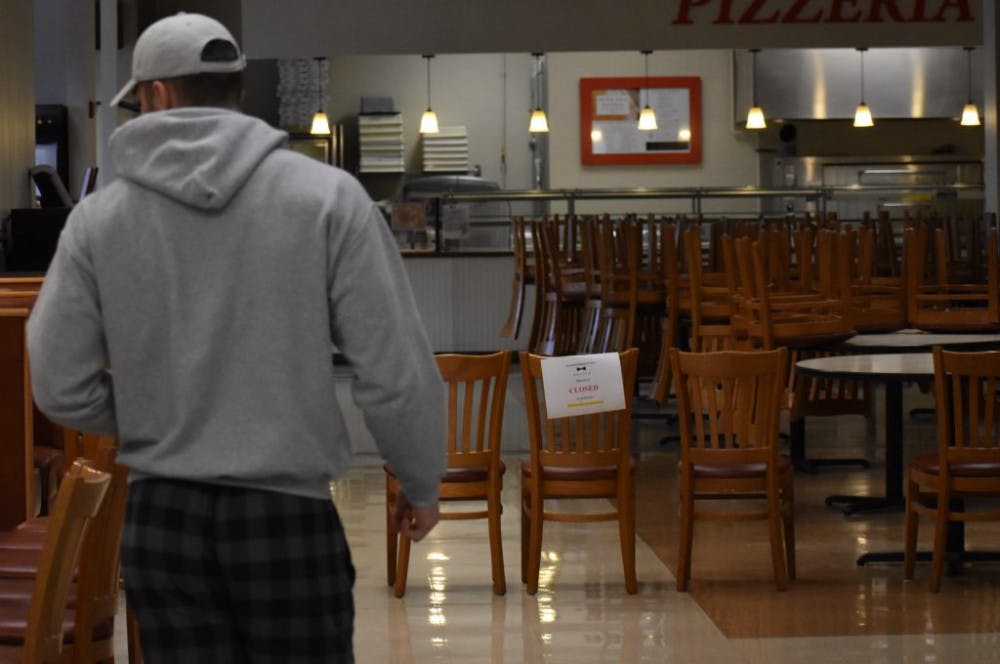Seton Hall’s Faculty Senate president announced Friday that the University is preparing for the possibility of a massive financial hit that would strip the University of tens of millions of dollars in annual revenue as a result of the COVID-19 pandemic.
In an executive committee report read to the Faculty Senate on Friday, Senate president Dr. Johnathan Farina said that the threats currently facing the University are “substantial” and “possibly existential.”

Farina said that the University is budgeting for four different financial scenarios, which range from a best-case scenario of a 10% decline in revenue amounting to a $41 million hit to the University budget to a worst-case 40% drop in revenue amounting to up to $150 million in losses.
Additionally, the University is projecting a $15 million loss from this year alone, including $9.1 million in room, board and parking refunds.
“Universities across the world face financial pressure because so many of the tuition-paying families we serve are suffering financially and because people worry that campuses might not be able to reopen, or reopen fully, in the fall,” Farina said in an interview with The Setonian. “Some universities also worry high school graduates will take gap years or prefer not to live away from home. Seton Hall is budgeting to be able to excel in any of the foreseeable scenarios. We operate rather efficiently, and that efficiency will help us weather this economy.”
In an effort to cut costs, Farina said that the University has already instituted a pay freeze, while the Board of Regents is exploring furloughing non-faculty employees who cannot work from home or are not deemed essential in the next few months, which could save the University substantial amounts of money but noted that it is not yet official.
“We should all exercise discretion, restraint, and care as we reference these matters, which are not yet set in stone, and work to decrease rather than accidentally add to, the stress levels of our employees and their families,” Farina said.
The measures follow a nationwide trend among colleges and universities now struggling to cope with the financial and academic ramifications of social distancing measures enacted to slow the spread of COVID-19.
“It's bad everywhere,” Dr. Robert Kelchen, an associate professor of higher education at Seton Hall, said. “What really matters for colleges now is can they get access to enough money to get through the next six to 12 months, because every everyone's going to have just massive operating losses.”
Kelchen said that this financial crisis could be very different for colleges and universities, who typically see increased enrollments during recessions but could now see the opposite during this particular circumstance.
“Typically, when there's a recession, enrollment in colleges increases,” Kelchen said, “and this may end up happening once we have a vaccine and people feel comfortable going out. But the change is also that with this deep of a recession that families may not be able or willing to pay as much for college and that can be a financial stress to the system.”
Kelchen says that while he expects the financial strain on Seton Hall to be harsh, he doesn’t think it will approach the worst case of $150 million in losses.
“That'd be half the budget,” Kelchen said adding that a 15-20% drop in revenue is more likely. Though it would be painful for the University, he doesn’t think that the Seton Hall is in as much jeopardy as other local private colleges.
“Caldwell is definitely in trouble. Bloomfield, Centenary, Saint Elizabeth, Felician, St Peter's, Georgian Court are as well,” Kelchen said. “Rider has been in trouble for a number of years. They'll have to downsize considerably.”
As for Seton Hall’s enrollment, Kelchen sees it as too early to tell as many schools have not yet decided what their fall semesters will look like, but says Seton Hall could potentially experience higher enrollment numbers than other universities as high school seniors begin to consider schools closer to home amid the uncertainty.
“The advantage that Seton hall has is about 40% of all high school seniors leave the state of New Jersey for college and they're typically going to fairly expensive places,” Kelchen said. “This could encourage some of the students to look at Seton Hall instead. The drawback is some students who might have otherwise considered Seton Hall might consider, say, the local community college until things settle down.”
“Last September we enrolled our biggest and most academically distinguished freshmen class ever,” Farina said. “This next year’s class will likely be smaller, but hopefully not too much smaller. It looks like it will be just as academically impressive.”
Those enrollment numbers could be hampered by the University’s decision on what it will do for classes during the fall semester.
Seton Hall has already pushed the fall start date back by three days to Aug. 31 to accommodate a new third summer session, but it is unclear what other changes could be made to the fall semester.
According to Farina, “possibilities are now endless.”
“Contrary to some of the rumors, we have not secretly decided on a specific schedule,” he said. “But Seton Hall will be prepared for whatever fall brings.”
Farina said that faculty are preparing different syllabi for all the possibilities, including in-person, remote, and hybrid semesters.
“Everybody hopes that we are all back on campus and back to normal again in September, but we follow the guidance of the CDC, the state, and scientific experts,” Farina said. “So, we do not know exactly what fall will hold.”
Nicholas Kerr can be reached at nicholas.kerr@student.shu.edu. Find him on Twitter @NickKerr99.





